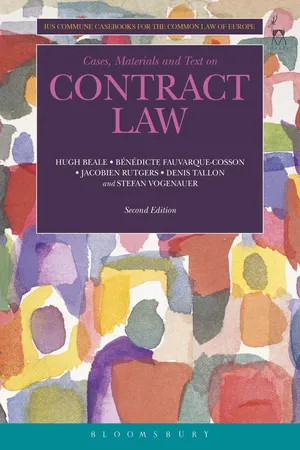
Contract Law
Ius Commune Casebooks for the Common Law of Europe
Hugh Beale, Bndicte Fauvarque-Cosson, Jacobien Rutgers, Denis Tallon, Stefan Vogenauer
- 1,442 pages
- English
- ePUB (mobile friendly)
- Available on iOS & Android
Contract Law
Ius Commune Casebooks for the Common Law of Europe
Hugh Beale, Bndicte Fauvarque-Cosson, Jacobien Rutgers, Denis Tallon, Stefan Vogenauer
About This Book
This is the second edition of the widely acclaimed and successful casebook on Contract in the Ius Commune Series, developed to be used throughout Europe and aimed at those who teach, learn or practise law with a comparative or European perspective. The book contains leading cases, legislation and other materials from the legal traditions within Europe, with a focus on English, French and German law as the main representatives of those traditions. The book contains the basic texts and contrasting cases as well as extracts from the various international restatements (the Vienna Sales Convention, the UNIDROIT Principles of International Commercial Contracts, the Principles of European Contract Law, the Draft Common Frame of Reference and so on). Materials are chosen and ordered so as to foster comparative study, and complemented with annotations and comparative overviews prepared by a multinational team. The whole Casebook is in English.
The principal subjects covered in this book include: General (including the distinctions between Contract and Property, Tort and Restitution) ; Formation; Validity; Interpretation and Contents; Remedies; Supervening Events; and Third Parties.
Please click on the link below to visit the series website:
www.casebooks.eu/contractLaw.
Frequently asked questions
Information
Table of contents
- Cover Page
- Title Page
- Copyright
- Contents
- Preface
- Abbreviations
- Table of cases
- Table of legislation
- Part One: Introduction
- Part Two: Formation
- Part Three: Fraud, Abuse, Immorality
- Part Four: Interpretation and Supplementation
- Part Five: Remedies for Non-Performance
- Part Six: Supervening Events
- Part Seven: Third Party Consequences
- Index